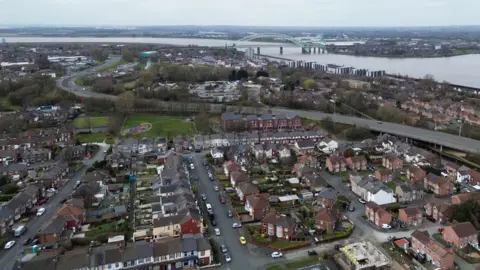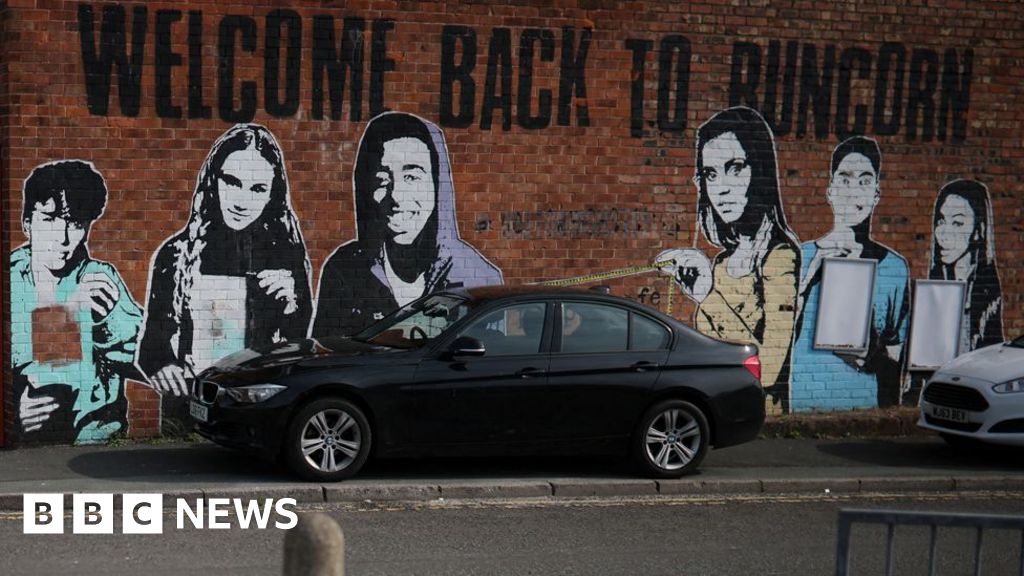
EPA
Voting has concluded in the Westminster by-election for Runcorn and Helsby, coinciding with local elections across various regions in England.
This by-election was initiated by the resignation of Mike Amesbury, who was found guilty of assaulting a constituent earlier this year.
What’s the background?
On February 27, Amesbury received a 10-week prison sentence, which led to his immediate transfer to HMP Altcourse in Liverpool.
After three nights, a judge decided to suspend his sentence for two years.
Facing increasing pressure to resign from the House of Commons, Amesbury, who lost Labour’s support following his arrest last autumn and has been serving as an independent, agreed to step down.
What about Runcorn and Helsby?
The Runcorn and Helsby constituency covers the towns of Runcorn, Frodsham, and Helsby, along with numerous villages and significant rural areas.
In total, 22% is classified as urban, 60% as rural, and 14% as water or wetland.
The constituency has a population of 93,520, with 21% of residents being under 18, 57% aged 18-64, and 21% over 65.
What is the constituency’s electoral history?
Runcorn and Helsby is a newly established constituency created for the July 2024 general election.
Over half of it (51.2%) originates from the prior constituency of Weaver Vale, with 37.1% from Halton and the rest from three other former constituencies: Ellesmere Port and Neston, Eddisbury, and City of Chester.
In the 2024 general election, Amesbury secured Runcorn and Helsby for Labour with 52.9% of the votes, gaining a majority of 14,696.
Reform UK came in second with 18% of the votes, trailed by the Conservatives at 16%, the Green Party at 6.4%, and the Liberal Democrats at 5.1%.
Two smaller parties collectively garnered 1.4% of the votes.
Amesbury previously served as the Labour MP for Weaver Vale from June 2017 until the constituency’s dissolution before the general election.
He took the seat from Conservative Graham Evans, who had represented the constituency since 2010.
Halton, established in 1983, has consistently been a Labour stronghold.
Derek Twigg, now the MP for Widnes and Halewood, held the position from 1997.
Why is this by-election significant?
This represents Sir Keir Starmer’s first by-election as prime minister.
A lot has transpired in the nine months since Labour took charge, including various tax increases announced in the Budget and ongoing discussions with President Trump regarding global trade and the conflict in Ukraine.
Professor Jon Tonge from the University of Liverpool stated to BBC Politics North West that, being one of the safest Labour seats, it would be a remarkable achievement for another party to win Runcorn and Helsby.
However, if recent polls are any indication, Reform UK appears confident entering the by-election, especially as they finished second in July.
The Conservatives are also on the lookout for signs of improvement; they placed third last time, closely trailing Reform.
There’s a lot at stake for all parties involved.
Who are the candidates?
Fifteen candidates will contest the by-election.
Listed alphabetically, they are:
- Catherine Anne Blaiklock (English Democrats)
- Dan Clarke (Liberal Party)
- Chris Copeman (Green Party)
- Paul Duffy (Liberal Democrats)
- Peter Ford (Workers Party)
- Howling Laud Hope (Monster Raving Loony Party)
- Sean Houlston (Conservatives)
- Jason Philip Hughes (Volt UK)
- Alan McKie (independent)
- Graham Harry Moore (English Constitution Party)
- Paul Andrew Murphy (Social Democratic Party)
- Sarah Pochin (Reform)
- Karen Shore (Labour)
- John Stevens (Rejoin EU)
- Michael Williams (independent)


